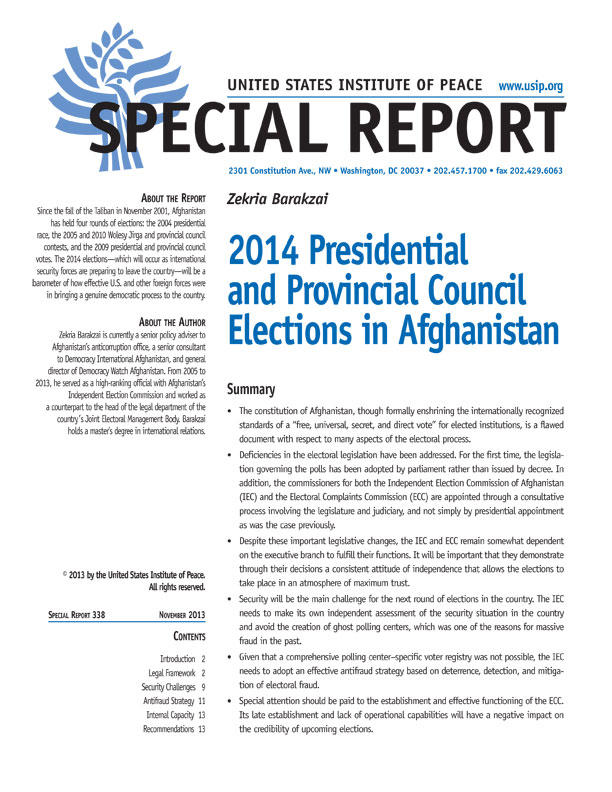Success of the upcoming elections in Afghanistan hinges on the independence and effectiveness of electoral institutions, wide voter participation, and a strong antifraud strategy. Recent changes in electoral law pave the way for a legitimate process, but much depends on how well Afghanistan’s electoral commissions can carry out their roles.
Summary
- The constitution of Afghanistan, though formally enshrining the internationally recognized standards of a “free, universal, secret, and direct vote” for elected institutions, is a flawed document with respect to many aspects of the electoral process.
- Deficiencies in the electoral legislation have been addressed. For the first time, the legislation governing the polls has been adopted by parliament rather than issued by decree. In addition, the commissioners for both the Independent Election Commission of Afghanistan (IEC) and the Electoral Complaints Commission (ECC) are appointed through a consultative process involving the legislature and judiciary, and not simply by presidential appointment as was the case previously.
- Despite these important legislative changes, the IEC and ECC remain somewhat dependent on the executive branch to fulfill their functions. It will be important that they demonstrate through their decisions a consistent attitude of independence that allows the elections to take place in an atmosphere of maximum trust.
- Security will be the main challenge for the next round of elections in the country. The IEC needs to make its own independent assessment of the security situation in the country and avoid the creation of ghost polling centers, which was one of the reasons for massive fraud in the past.
- Given that a comprehensive polling center–specific voter registry was not possible, the IEC needs to adopt an effective antifraud strategy based on deterrence, detection, and mitigation of electoral fraud.
- Special attention should be paid to the establishment and effective functioning of the ECC. Its late establishment and lack of operational capabilities will have a negative impact on the credibility of upcoming elections.
- The technical deficiencies of the IEC, including staffing, election budget, and effective international technical assistance, should be addressed as soon as possible.
About the Report
Since the fall of the Taliban in November 2001, Afghanistan has held four rounds of elections: the 2004 presidential race, the 2005 and 2010 Wolesy Jirga and provincial council contests, and the 2009 presidential and provincial council votes. The 2014 elections—which will occur as international security forces are preparing to leave the country—will be a barometer of how effective U.S. and other foreign forces were in bringing a genuine democratic process to the country.
About the Author
Zekria Barakzai is currently a senior policy adviser to Afghanistan’s anticorruption office, a senior consultant to Democracy International Afghanistan, and general director of Democracy Watch Afghanistan. From 2005 to 2013, he served as a high-ranking official with Afghanistan’s Independent Election Commission and worked as a counterpart to the head of the legal department of the country ’s Joint Electoral Management Body. Barakzai holds a master’s degree in international relations.
